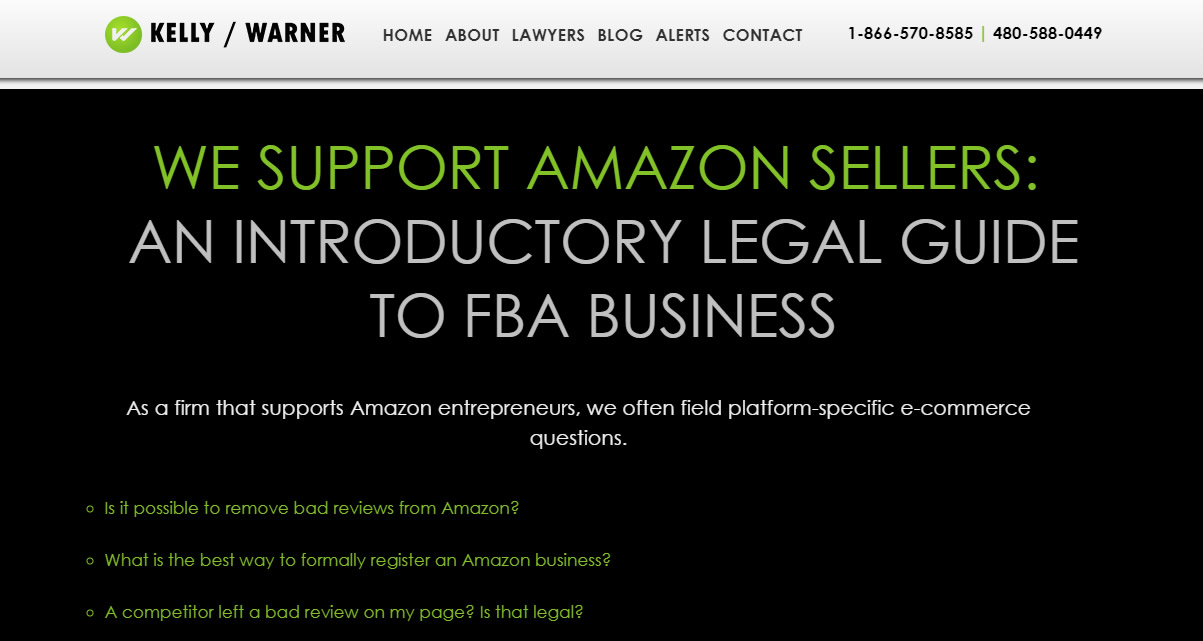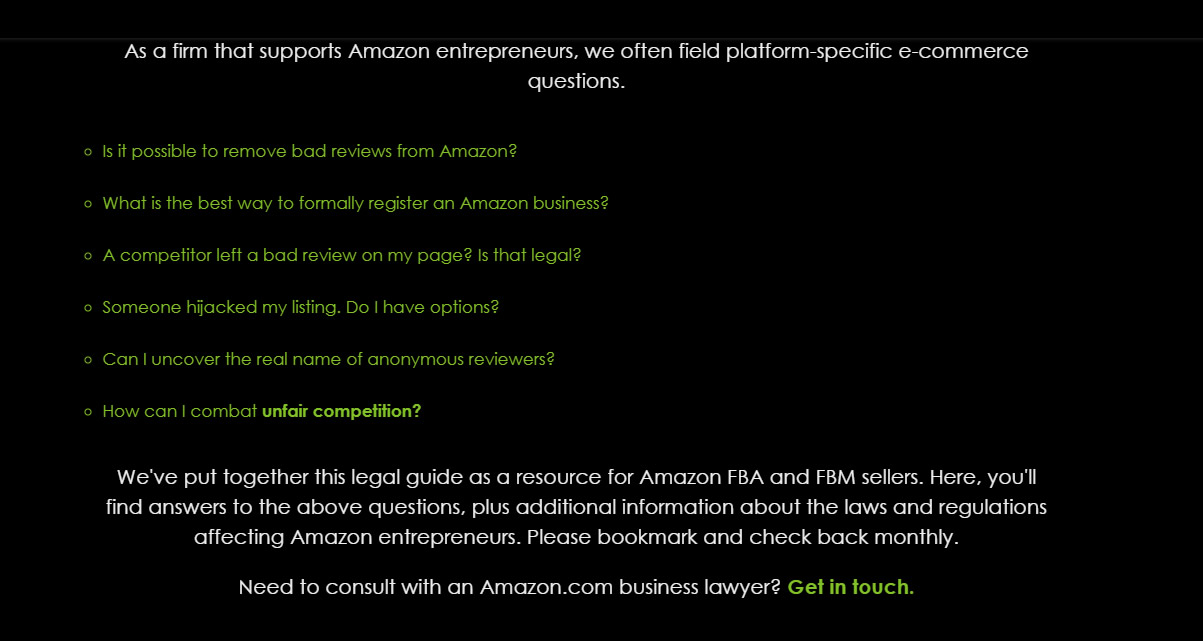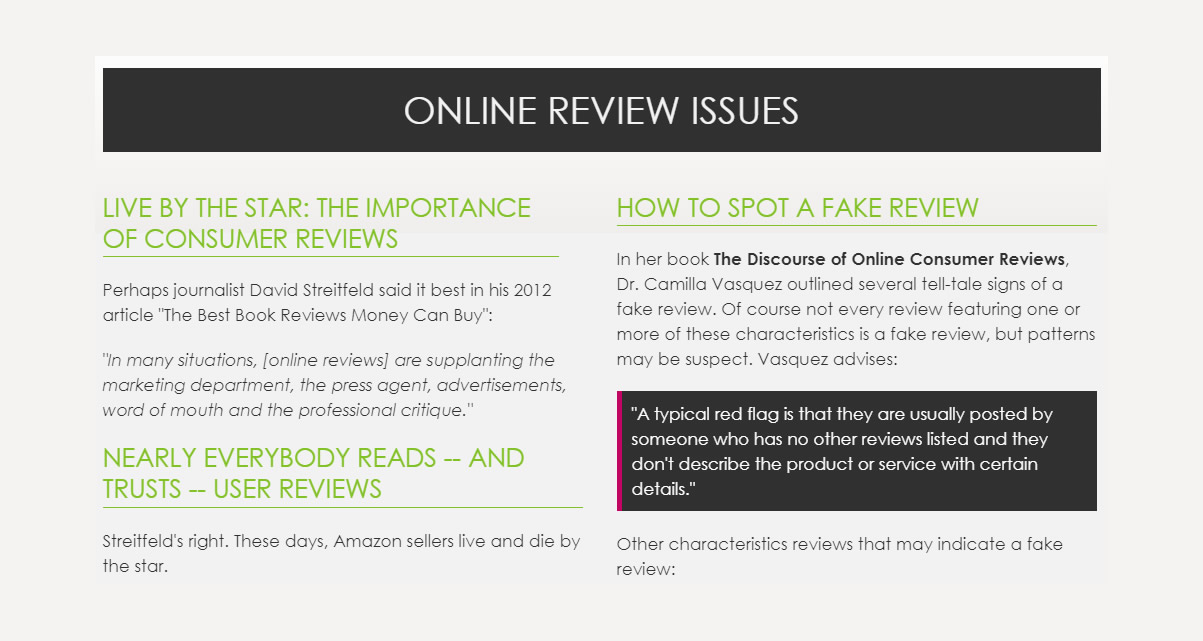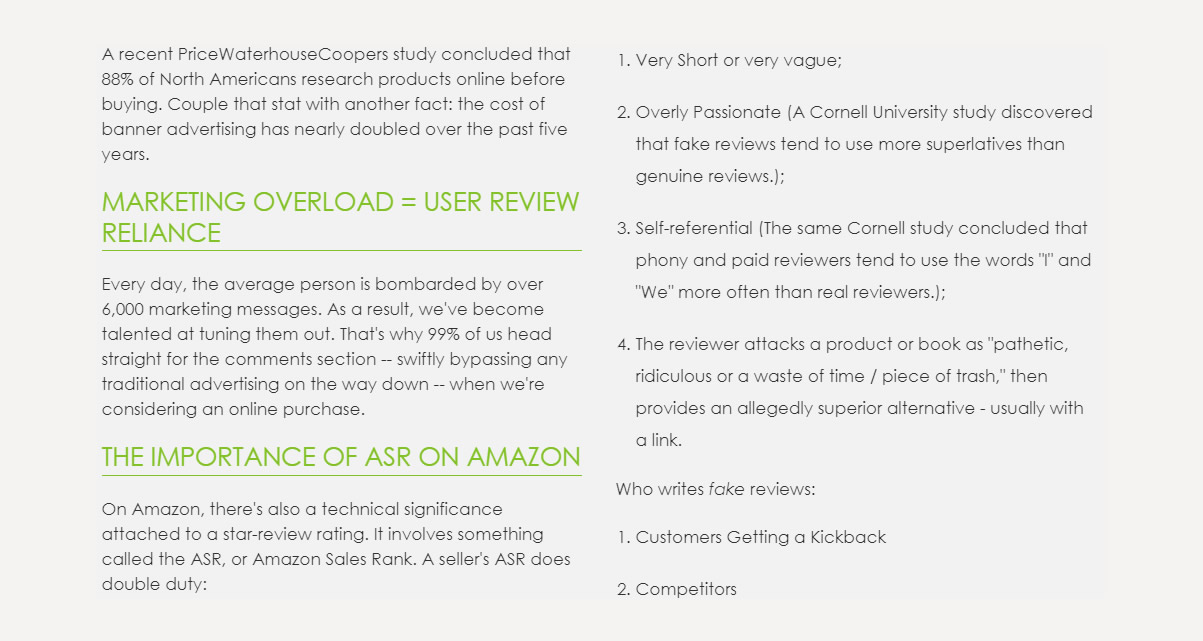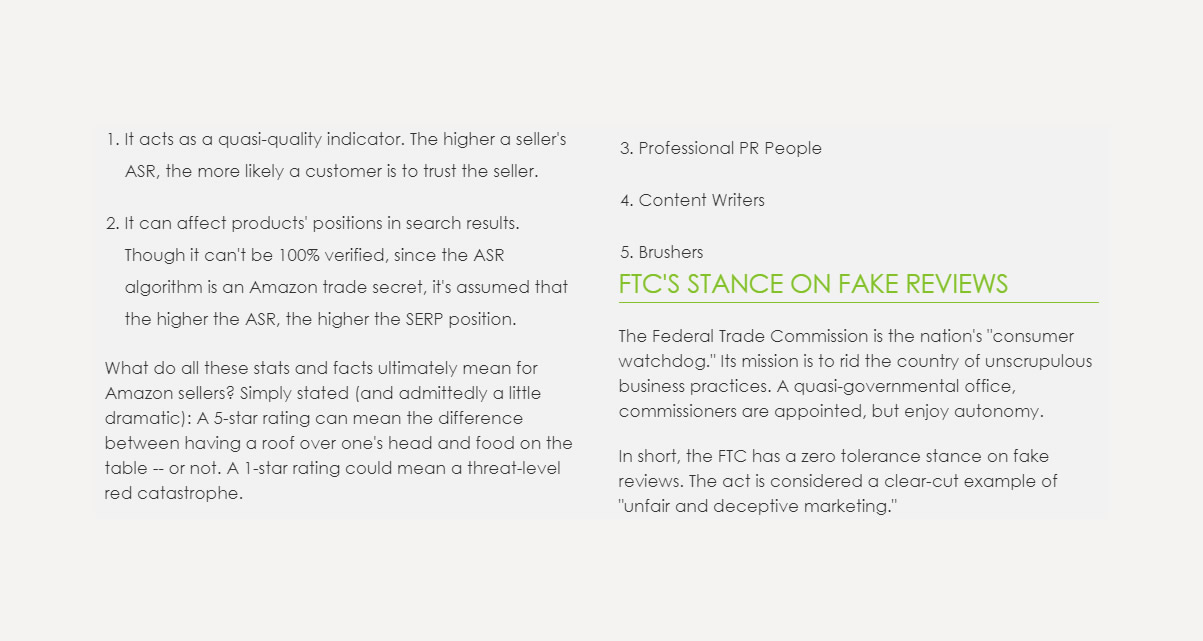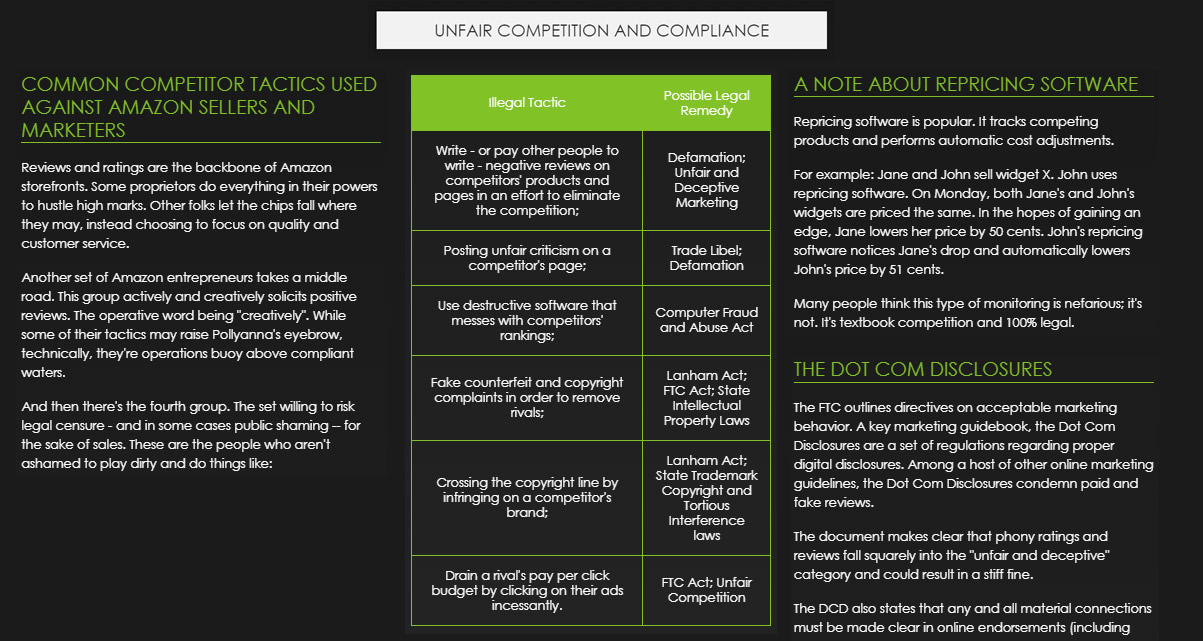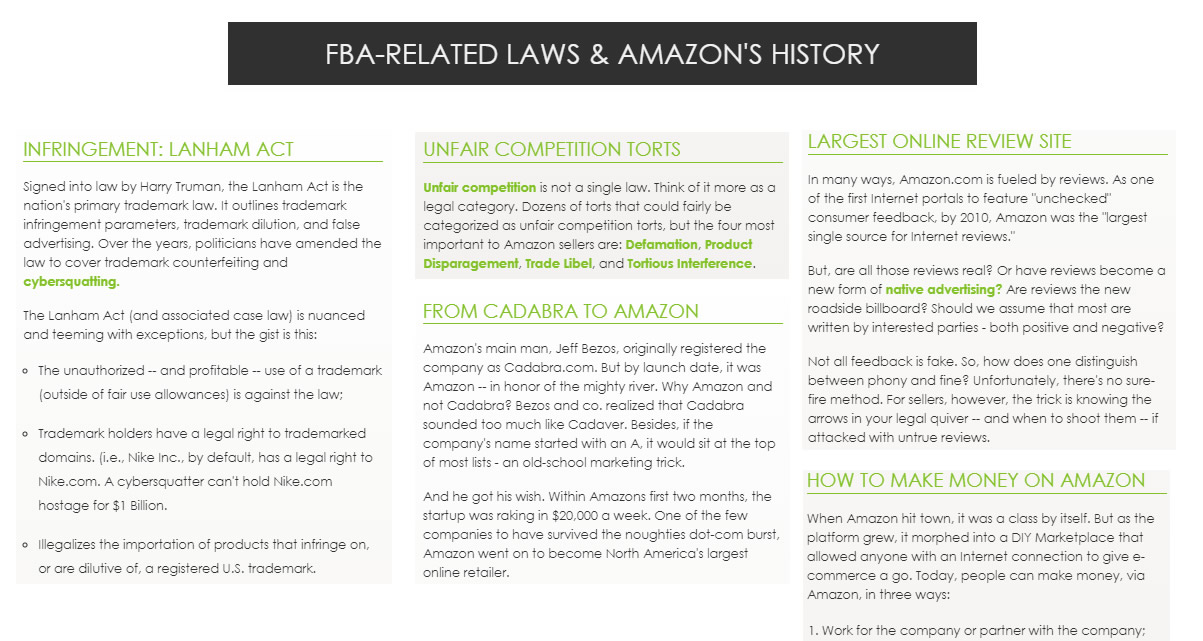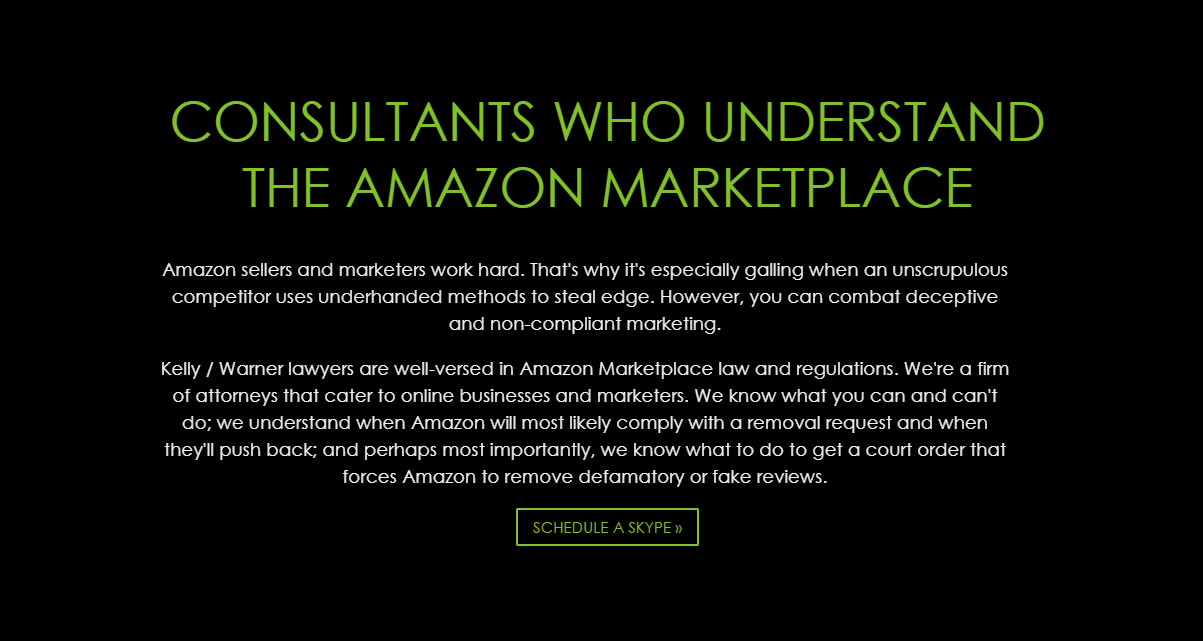WE SUPPORT AMAZON SELLERS: AN INTRODUCTORY LEGAL GUIDE TO FBA BUSINESS
As a firm that supports Amazon entrepreneurs, we often field platform-specific e-commerce questions.
- Is it possible to remove bad reviews from Amazon?
- What is the best way to formally register an Amazon business?
- A competitor left a bad review on my page? Is that legal?
- Someone hijacked my listing. Do I have options?
- Can I uncover the real name of anonymous reviewers?
- How can I combat unfair competition?
We've put together this legal guide as a resource for Amazon FBA and FBM sellers. Here, you'll find answers to the above questions, plus additional information about the laws and regulations affecting Amazon entrepreneurs. Please bookmark and check back monthly.
Need to consult with an Amazon.com business lawyer? Get in touch.
ONLINE REVIEW ISSUES
LIVE BY THE STAR: THE IMPORTANCE OF CONSUMER REVIEWS
Perhaps journalist David Streitfeld said it best in his 2012 article "The Best Book Reviews Money Can Buy":
"In many situations, [online reviews] are supplanting the marketing department, the press agent, advertisements, word of mouth and the professional critique."
NEARLY EVERYBODY READS — AND TRUSTS — USER REVIEWS
Streitfeld's right. These days, Amazon sellers live and die by the star.
A recent PriceWaterhouseCoopers study concluded that 88% of North Americans research products online before buying. Couple that stat with another fact: the cost of banner advertising has nearly doubled over the past five years.
MARKETING OVERLOAD = USER REVIEW RELIANCE
Every day, the average person is bombarded by over 6,000 marketing messages. As a result, we've become talented at tuning them out. That's why 99% of us head straight for the comments section — swiftly bypassing any traditional advertising on the way down — when we're considering an online purchase.
THE IMPORTANCE OF ASR ON AMAZON
On Amazon, there's also a technical significance attached to a star-review rating. It involves something called the ASR, or Amazon Sales Rank. A seller's ASR does double duty:
- It acts as a quasi-quality indicator. The higher a seller's ASR, the more likely a customer is to trust the seller.
- It can affect products' positions in search results. Though it can't be 100% verified, since the ASR algorithm is an Amazon trade secret, it's assumed that the higher the ASR, the higher the SERP position.
What do all these stats and facts ultimately mean for Amazon sellers? Simply stated (and admittedly a little dramatic): A 5-star rating can mean the difference between having a roof over one's head and food on the table — or not. A 1-star rating could mean a threat-level red catastrophe.
HOW TO SPOT A FAKE REVIEW
In her book The Discourse of Online Consumer Reviews, Dr. Camilla Vasquez outlined several tell-tale signs of a fake review. Of course not every review featuring one or more of these characteristics is a fake review, but patterns may be suspect. Vasquez advises:
"A typical red flag is that they are usually posted by someone who has no other reviews listed and they don't describe the product or service with certain details."
Other characteristics reviews that may indicate a fake review:
- Very Short or very vague;
- Overly Passionate (A Cornell University study discovered that fake reviews tend to use more superlatives than genuine reviews.);
- Self-referential (The same Cornell study concluded that phony and paid reviewers tend to use the words "I" and "We" more often than real reviewers.);
- The reviewer attacks a product or book as "pathetic, ridiculous or a waste of time / piece of trash," then provides an allegedly superior alternative – usually with a link.
Who writes fake reviews:
- Customers Getting a Kickback
- Competitors
- Professional PR People
- Content Writers
- Brushers
FTC'S STANCE ON FAKE REVIEWS
The Federal Trade Commission is the nation's "consumer watchdog." Its mission is to rid the country of unscrupulous business practices. A quasi-governmental office, commissioners are appointed, but enjoy autonomy.
In short, the FTC has a zero tolerance stance on fake reviews. The act is considered a clear-cut example of "unfair and deceptive marketing."
UNFAIR COMPETITION AND COMPLIANCE
COMMON COMPETITOR TACTICS USED AGAINST AMAZON SELLERS AND MARKETERS
Reviews and ratings are the backbone of Amazon storefronts. Some proprietors do everything in their powers to hustle high marks. Other folks let the chips fall where they may, instead choosing to focus on quality and customer service.
Another set of Amazon entrepreneurs takes a middle road. This group actively and creatively solicits positive reviews. The operative word being "creatively". While some of their tactics may raise Pollyanna's eyebrow, technically, they're operations buoy above compliant waters.
And then there's the fourth group. The set willing to risk legal censure – and in some cases public shaming — for the sake of sales. These are the people who aren't ashamed to play dirty and do things like:
| llegal Tactic | Possible Legal Remedy |
| Write – or pay other people to write – negative reviews on competitors' products and pages in an effort to eliminate the competition; | Defamation; Unfair and Deceptive Marketing |
| Posting unfair criticism on a competitor's page; | Trade Libel; Defamation |
| Use destructive software that messes with competitors' rankings; | Computer Fraud and Abuse Act |
| Fake counterfeit and copyright complaints in order to remove rivals; | Lanham Act; FTC Act; State Intellectual Property Laws |
| Crossing the copyright line by infringing on a competitor's brand; | Lanham Act; State Trademark Copyright and Tortious Interference laws |
| Drain a rival's pay per click budget by clicking on their ads incessantly. | FTC Act; Unfair Competition |
A NOTE ABOUT REPRICING SOFTWARE
Repricing software is popular. It tracks competing products and performs automatic cost adjustments.
For example: Jane and John sell widget X. John uses repricing software. On Monday, both Jane's and John's widgets are priced the same. In the hopes of gaining an edge, Jane lowers her price by 50 cents. John's repricing software notices Jane's drop and automatically lowers John's price by 51 cents.
Many people think this type of monitoring is nefarious; it's not. It's textbook competition and 100% legal.
THE DOT COM DISCLOSURES
The FTC outlines directives on acceptable marketing behavior. A key marketing guidebook, the Dot Com Disclosures are a set of regulations regarding proper digital disclosures. Among a host of other online marketing guidelines, the Dot Com Disclosures condemn paid and fake reviews.
The document makes clear that phony ratings and reviews fall squarely into the "unfair and deceptive" category and could result in a stiff fine.
The DCD also states that any and all material connections must be made clear in online endorsements (including Amazon reviews). But, can the FTC, realistically, enforce the "material disclosure" clause on every person who has ever written an online review? Of course not. For starters, the FTC's stated goal is to protect consumers, so they can't very well start going after the very people they've vowed to protect. Secondly, it's not fiscally practical to legally hound individual reviewers.
So, how does the FTC operate? They go after flagrant violators. The people who establish fake review empires.
Now, that doesn't mean parties can't legally stop an unscrupulous competitor who crosses the compliance line.
FBA-RELATED LAWS & AMAZON'S HISTORY
INFRINGEMENT: LANHAM ACT
Signed into law by Harry Truman, the Lanham Act is the nation's primary trademark law. It outlines trademark infringement parameters, trademark dilution, and false advertising. Over the years, politicians have amended the law to cover trademark counterfeiting and cybersquatting.
The Lanham Act (and associated case law) is nuanced and teeming with exceptions, but the gist is this:
- The unauthorized — and profitable — use of a trademark (outside of fair use allowances) is against the law;
- Trademark holders have a legal right to trademarked domains. (i.e., Nike Inc., by default, has a legal right to Nike.com. A cybersquatter can't hold Nike.com hostage for $1 Billion.
- Illegalizes the importation of products that infringe on, or are dilutive of, a registered U.S. trademark.
- Lays down the rules for trademark registration, disallowing for the registration of marks or brand names that are:
- Confusingly similar to another mark or brand;
- Generic or merely descriptive (i.e., "cookies for an actual cookie company")
- Scandalous or immoral (a statute relic from the 1940s)
- Condemns any commercial / marketing activity likely to cause marketplace confusion, like:
- False designations of origins;
- False descriptions;
- Misleading descriptions or representations of fact.
UNFAIR COMPETITION TORTS
Unfair competition is not a single law. Think of it more as a legal category. Dozens of torts that could fairly be categorized as unfair competition torts, but the four most important to Amazon sellers are: Defamation, Product Disparagement, Trade Libel, and Tortious Interference.
FROM CADABRA TO AMAZON
Amazon's main man, Jeff Bezos, originally registered the company as Cadabra.com. But by launch date, it was Amazon — in honor of the mighty river. Why Amazon and not Cadabra? Bezos and co. realized that Cadabra sounded too much like Cadaver. Besides, if the company's name started with an A, it would sit at the top of most lists – an old-school marketing trick.
And he got his wish. Within Amazons first two months, the startup was raking in $20,000 a week. One of the few companies to have survived the noughties dot-com burst, Amazon went on to become North America's largest online retailer.
LARGEST ONLINE REVIEW SITE
In many ways, Amazon.com is fueled by reviews. As one of the first Internet portals to feature "unchecked" consumer feedback, by 2010, Amazon was the "largest single source for Internet reviews."
But, are all those reviews real? Or have reviews become a new form of native advertising? Are reviews the new roadside billboard? Should we assume that most are written by interested parties – both positive and negative?
Not all feedback is fake. So, how does one distinguish between phony and fine? Unfortunately, there's no sure-fire method. For sellers, however, the trick is knowing the arrows in your legal quiver — and when to shoot them — if attacked with untrue reviews.
HOW TO MAKE MONEY ON AMAZON
When Amazon hit town, it was a class by itself. But as the platform grew, it morphed into a DIY Marketplace that allowed anyone with an Internet connection to give e-commerce a go. Today, people can make money, via Amazon, in three ways:
- Work for the company or partner with the company;
- Become an online affiliate for Amazon.com;
- Set up and manage an Amazon store, or make use of one of Amazon's commission-generating apps and plugins.
FBA FAQ
IS IT POSSIBLE TO REMOVE BAD REVIEWS FROM AMAZON?
If a review is legitimately defamatory, a defamation or trade libel claim is always an option. The good news, however, is that negative reviews can often be cleared up with a bit of diplomacy.
WHAT IS THE BEST WAY TO FORMALLY REGISTER AN AMAZON BUSINESS?
The best business formation plan depends on your size, plan, and location. Talk to an ecommerce consultant about your situation to figure out the best plan of action.
FULFILLMENT BY AMAZON IN THE NEWS
- FAKE REVIEW SCAMMER JAILED?
- AMAZON CENSURED OVER APPS FOR KIDS
- IS IT LEGAL TO POST ONLINE REVIEWS OF MY PRODUCT?
- AMAZON LOOPHOLE & FEEDBACK BLACKMAIL?
- MOGUL: AMAZON GREAT FOR BRICK AND MORTAR
- FTC PUNISHES INFLUENCERS THAT DON’T DISCLOSE
- ALIBABA COUNTERFEITS: A LEGAL OVERVIEW
- MADE IN THE USA: WHAT ARE THE RULES?
- E-COMMERCE: THE BEST JOBS OPTION?
- START AN E-COMMERCE BUSINESS
- BLACKLISTING ALIBABA: WHAT DOES IT ALL MEAN?
- AMAZON WAGING WAR ON KNOCKOFFS
- AMAZON ESPORTS TOURNAMENT SHOW
- WILL TRUMP CRUSH THE ECOMMERCE MARKET?
- AMAZON SUES OVER FAKE REVIEWS
CONSULTANTS WHO UNDERSTAND THE AMAZON MARKETPLACE
Amazon sellers and marketers work hard. That's why it's especially galling when an unscrupulous competitor uses underhanded methods to steal edge. However, you can combat deceptive and non-compliant marketing.
Kelly / Warner lawyers are well-versed in Amazon Marketplace law and regulations. We're a firm of attorneys that cater to online businesses and marketers. We know what you can and can't do; we understand when Amazon will most likely comply with a removal request and when they'll push back; and perhaps most importantly, we know what to do to get a court order that forces Amazon to remove defamatory or fake reviews.





